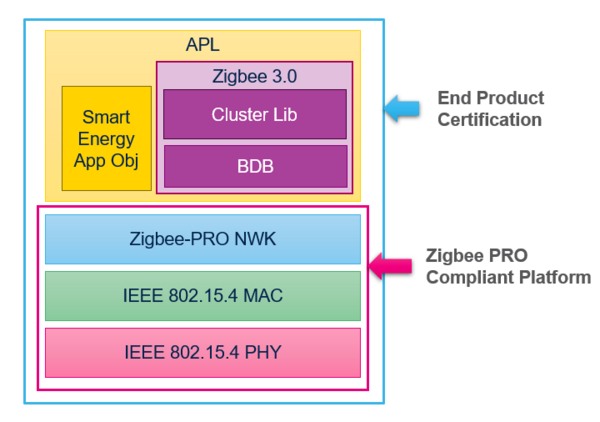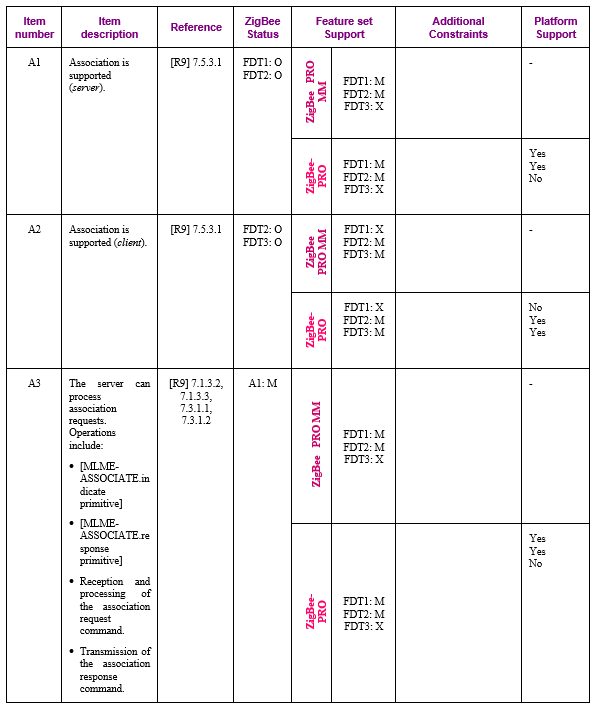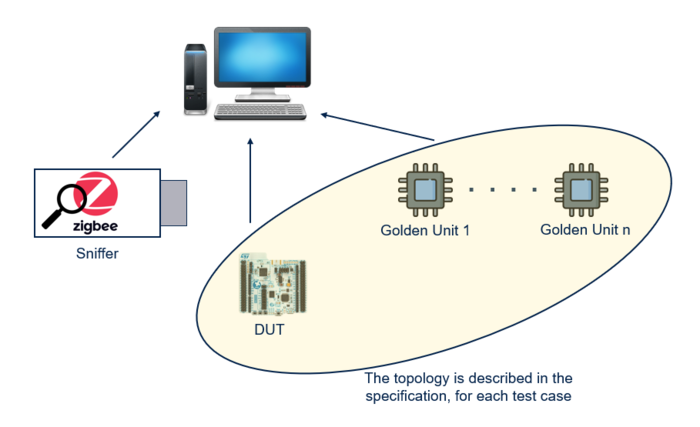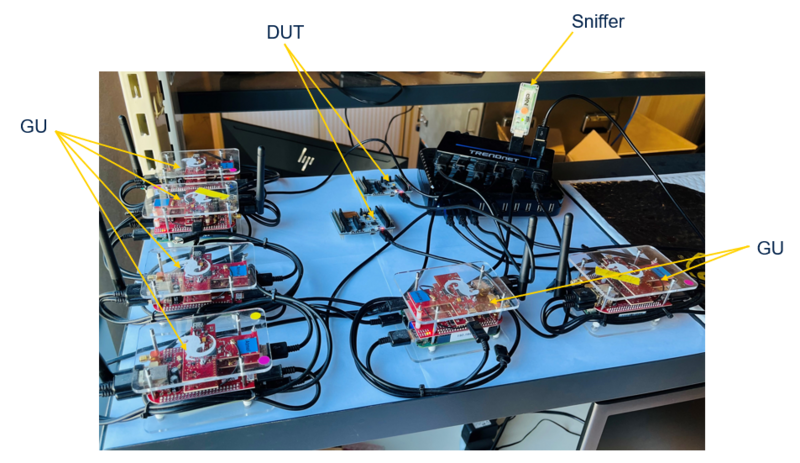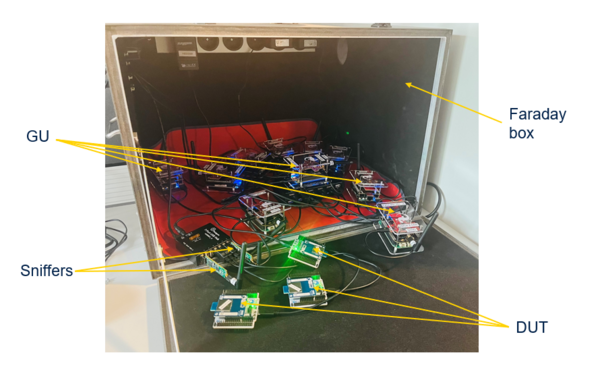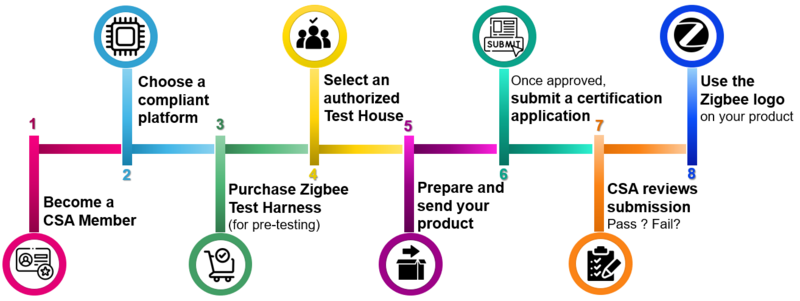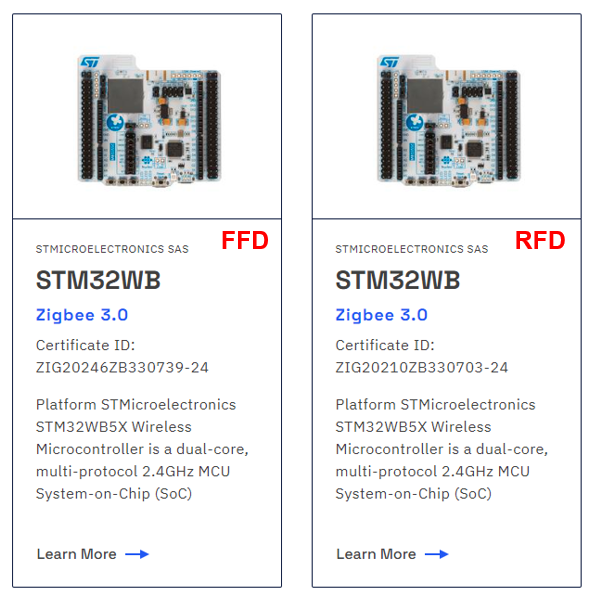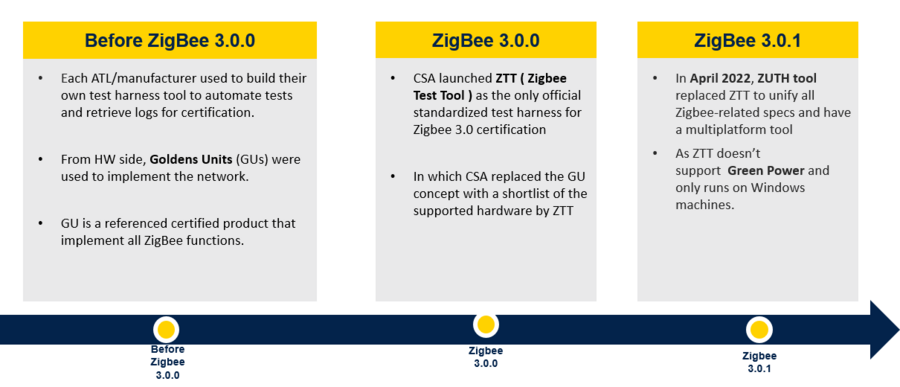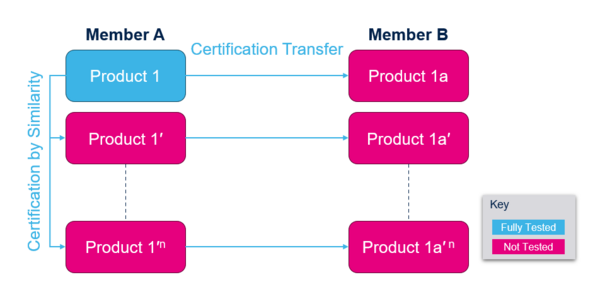1. Introduction
Zigbee® is widely used in smart homes, commercial, and industrial applications. To ensure interoperability between Zigbee devices, the CSA has established a certification process that involves rigorous testing.
Depending on the scope of the certification, two types of certifications are defined:
- Platform Certification
- Zigbee PRO Compliant Platform (FFD/RFD)
- End Product Certification
- Zigbee 3.0 Certified Product (FFD/RFD)
- Zigbee Smart Energy Product (FFD/RFD)
Zigbee Certified End Product must be built on a Zigbee PRO Compliant Platform.
2. Zigbee Certification Process
To obtain a Zigbee certification, companies must join the Zigbee Alliance and follow a general set of steps:
- Select the type of certification to pursue, such as Zigbee Platform Certification or End Product Certification.
- Ensuring that the product meets the necessary hardware, software, and functional requirements.
- If the company wishes, they can also conduct an in-house pre-certification to identify and address any issues before submitting the product for testing.
- Once the product is ready, the company must select an authorized test house and submit the product for testing. The list of authorized testing providers could be found here.
- If the product fails any of the tests, the company must address the issues and resubmit the product for testing.
- Once the product passes all the tests, the company will receive the appropriate certification, such as the Zigbee Certified logo.
3. Zigbee Platform Certification
- Zigbee Platform Certification is a process that certifies the compliance of a specific hardware or software platform with the CSA standards and requirements for interoperability with other Zigbee devices. The certification process involves rigorous testing of the product's hardware, software, and functionality to ensure that it can communicate effectively with other Zigbee devices and operate within a Zigbee network. This certification is typically obtained by manufacturers of chips and software stacks.
- The test house requires completed versions of PICS documents. The PICS is a checklist (Yes/No) table of supported functions by the platform. From this documents, test house can drive the test cases during certification.
Among the table elements, feature set support shows if an item is mandatory (M), optional (O), or prohibited (X) based on whether another item reflects the DUT’s behavior. All mandatory PICS items must be supported.
- Depending on device type, FFD or RFD, dedicated tests set will be applied.
- Green Power Proxy tests (GPP) are run as part of Zigbee Platform Certification to ensure that the platform or device can support GPP functionality and can communicate with low-power devices using GPP.
- 802.15.4 MAC & PHY certification has to be performed before running Zigbee PRO Compliant Platform certification tests.
3.1. Setting up ST test harness for Zigbee Pro Compliant Platform testing
By conducting in-house testing using a test harness, companies can simulate the testing environment and identify any potential issues that may arise during formal certification testing. This can help saving time and money.
Test specification defines the list of test cases to be run, detailing methods to be used, expected outcomes, and observables.
The following items are needed to set up the test harness:
- Device Under Test (DUT): refers to the product or device that is being tested.
- Golden Unit (GU): is used as a reference platform. It is certified by the CSA and considered to be the standard.
- Sniffer to capture and analyze communication over the air.
- Powered USB Hub.
It is necessary to meet the following hardware/software requirements to get the STM32WB certification:
Hardware requirements:
- DUT: STM32WB
- GU: Exegin Q55
Software used:
- DUT:
- For M0: stm32wbxxxFFD.bin or stm32wbxxxRFD.bin depending on the test/role
- For M4: in-house developed application
- GU: Exegin firmware
It is necessary to meet the following hardware/software requirements to get the STM32WBA certification:
Hardware requirements:
- DUT: STM32WBA
- GU: Exegin bbg90-atmel
Software used:
- DUT: Zigbee-FFDxxx.bin or Zigbee-RFDxxx.bin depending on the test/role, with a Zigbee command line interface application.
- GU: Exegin firmware
3.2. Certification status
- STM32WB is Zigbee PRO R22 Compliant Platform certified, and is referenced on Connectivity Standards Alliance website.
- Ongoing certification for STM32WBA Zigbee PRO R23 Compliant Platform.
4. End Product Certification
End Product Certification is a process that certifies the compliance of a final product or device that incorporates Zigbee technology with the CSA standards and requirements. This certification is typically obtained by manufacturers of consumer/commercial products that use Zigbee technology, such as smart home devices or lighting systems.
4.1. Zigbee 3.0 Certification
This certification intends to check Zigbee End Product interoperability & application middleware (ZCL cluster library/BDB).
Depending on device type (FFD/RFD), dedicated BDB tests set applies.
Zigbee Green Proxy cluster (GPP) is mandatory to get Zigbee 3.0 certificate in FFD device case.
Zigbee PRO Compliant platform certification has to be obtained before running Zigbee 3.0 certification tests. The list of the compliant platforms can be found on the CSA web page and can be filtered by company, device type, and program type.
STM32WB has been Zigbee 3.0 certified for FFD and RFD: CSA site.
4.2. Zigbee Smart Energy Certification
Zigbee SE Certification can only be performed with a real End Product with dedicated hardware such as power/gas meter. As a result, Zigbee SE Certification is not applicable to STM32WB.
Two versions of SE certification are defined:
- ZigBee Smart Energy v1.2b
- ZigBee Smart Energy v1.4
Zigbee SE certification intends to check Zigbee End Product interoperability & application middleware (ZCL cluster library/BDB).
Zigbee PRO Compliant platform certification has to be performed before running Zigbee SE certification tests.
5. Official CSA Certification tools
5.1. Zigbee Unified Test Harness (ZUTH)
It is the official CSA test tool for certification testing. It is used for formal testing by Alliance Authorized Test Laboratories (ATLs) and is also available to all Alliance members for pre-certification testing.
ZUTH is a flexible testing tool for Zigbee that can be used in both Command Line Interface (CLI) and Graphical User Interface (GUI) modes. It allows users to execute individual or multiple test cases, create log files, and create custom test cases using Python. The tool is compatible with Windows® 10, Mac®, and Linux® operating systems.
For instance, ZUTH is mainly targeting cluster validation.
6. Certification by Similarity Program
The CSA offers a certification by similarity Program that allows a Zigbee product that is derived from a certified Zigbee product to keep the certification without having to go through the entire certification process again. The aim of this program is to reduce certification costs and minimize the time and the effort.
In general, the program allows for changes that are considered minor and do not significantly impact the conformance of the product to Zigbee standards. These changes may include modifications to the product's design, components, or materials, as long as they do not affect Zigbee or radio functionality.
If the original certified product on which the certification by similarity is based is older than three years, then the product may not be eligible for the program, and complete testing is required.
7. Certification Transfer Program
Customers who want to sell a certified product but do not want to go through the entire certification process themselves can participate in the Certification Transfer Program. Customers are allowed to re-certify the product under its company name. Once a product has been approved for certification by the Connectivity Standards Alliance, the product can display the Certified logo for that standard under the name of the Adopter company.
Eligible products for this Transfer program must:
- be an End Product.
- be previously certified by the Alliance.
- belong to a participant or promoter member company.
8. Acronyms and definitions
| Term | Definition |
|---|---|
| ATL | Authorized Test Lab |
| BDB | Base Device Behavior |
| CLI | Command Line Interface |
| DUT | Device Under Test |
| FFD | Full Feature Device |
| RFD | Reduced Feature Device |
| PICS | Protocol Implementation Conformance Statement |
| ZCL | ZigBee Cluster Library |
9. References
